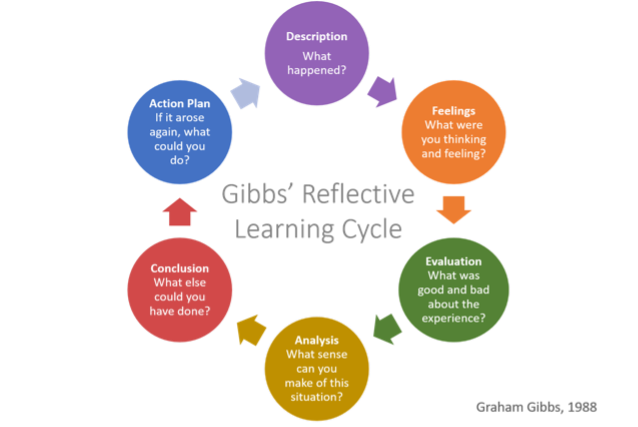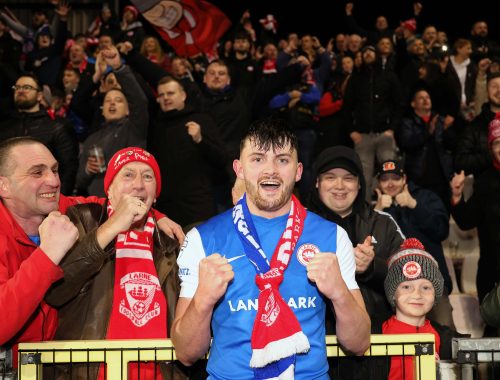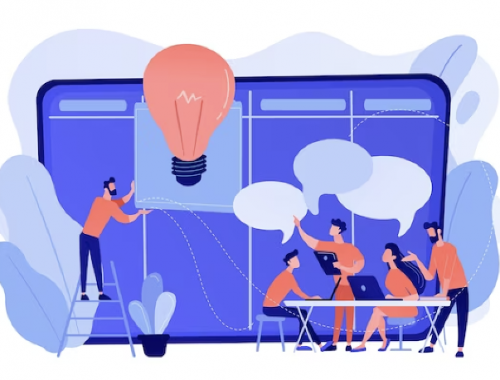Priceless Proactivity
As a child, W5 in Belfast was a place of wonder. It had always held a special place in my heart, so returning many years later to complete work experience left me struck with confusing feelings of nostalgia mixed with pride. These feelings filled me with a positive attitude towards the day ahead. When I arrived, I checked the time. 8:30am. My morning rush had landed me half an hour early to Cinemagic’s first ‘Belfast Harbour talent Lab’ event of the year. The building was still shut so I nestled into what I thought was the ideal spot to oversee familiar faces arriving in the car park and waited…

To effectively reflect on my experience at the event which kicked off Cinemagic’s annual Film Festival, I will utilise the Gibbs’ reflective cycle to ensure I thoroughly describe and evaluate the elements which contributed to my experience, as well as learn from the mistakes I made.

DESCRIPTION AND FEELINGS
9:00am arrived and after multiple walks around the building, I began to doubt myself. Had I gone to the wrong location by accident? Or maybe the event was next weekend? By 9:15am, I had triple checked the email stating the events time and location and contacted Cinemagic staff members and volunteers to try to clear up my confusion and anxiety, to no avail.

After a final attempt to enter the building, I found that a sneaky side door had been opened and I felt incredibly embarrassed for having missed it. It was now 9:30am and I was late. Due to this, I had given a disinterested and unreliable impression to the staff members, and this sent the day and my emotions into a downwards spiral.
I attempted to rectify this by having an open and willing attitude towards my first task – signing participants into the event. I remained professional and provided a welcoming face to the hordes of young adults who spilled out of the elevator. The next issue arose from having to juggle lists of participants for the two simultaneous masterclasses by myself, both containing out-of-date information which I had to navigate around on the spot. At this point, I was feeling extremely overwhelmed, as I had been thrown in the deep end with very little supervision. I had underestimated the level of independence I was expected to show, due to a lack of in-depth briefing before the event, which exacerbated my hidden defeated attitude from the mornings’ antics. After a while of waiting for late-comers, I noticed I was the only person who wasn’t attending a masterclass. Without direct instruction to leave the desk, I sat indefinitely and anxiety-riddled until I finally took the initiative to enter one of the talks. From that point on, I had nonthreatening responsibilities, such as handing out sheets and fetching coffees. I took this time to try and calm my nerves from the hectic morning, but couldn’t, and once lunch time arrived, I decided I had to leave. Feeling too nervous to tell my supervisor in person, I emailed her stating that I had to go home and shamefully abandoned the event.

EVALUATION AND ANALYSIS
This experience was a rollercoaster of emotions, beginning positively but rocketing down almost immediately and remaining there. While reflecting on the experience on my walk home, I was faced with issues of doubting my resilience and decision-making skills. This caused feelings of despair and disappointment. I had convinced myself that I wasn’t skilled enough to be working at this kind of event, which massively impacted my self-confidence. Although I found the experience challenging, I can now recognise how gaining this ‘real’ experience has had a positive impact on my skill development, allowing me to develop generic skills such as communication and organisation, which will assist me in my career. This is supported by a research article by Crebert et al. (2004) which states: “Findings showed that while graduates recognized the contribution university had made to their generic skills development, they greatly valued the experience of learning in the workplace during placement and subsequently in employment.” Through this experience, I also collected insider knowledge and experience on how these large-scale events are ran, and this has become integral to my confidence at all subsequent work placement events.

CONCLUSION AND ACTION PLAN
To improve my experience, I could have made more effective use of tips I received from my Work-Based Learning module, such as to aim for clear and assertive communication. Had I utilised this effectively, I may have received more information from my supervisor about my responsibilities and therefore have felt better prepared for the event. I had done some research on preparing for a my first ‘real’ day of placement to help ease my nerves. Making use of websites such as Indeed, specifically it’s ‘Career Guide’ section titled ‘13 helpful tips for a successful first day of work’, helped to influence all aspects of my behaviour.

Reflecting on this, I realise that I let this advice sway my perception of the day. I dismissed what I considered the ‘easy’ tips, when I should have placed focus on them to help ease my nerves. For example, “Enter the building on time. By arriving at the correct time, you can make a positive impression on your first day,” and “End the day positively. Even if you experienced issues during your first day, try to accept that this is inevitable in a new job and reassure yourself that things can only improve over time.” Had I taken this advice seriously, I may not have let my lack of awareness cause me to be late and have completed the day with a positive attitude. If I were to find myself in this situation again, I would make sure to utilise such advice to help alleviate any pressure I may be feeling. Putting more effort into developing my observational skills will allow me to be more punctual in the future and taking more time to prepare will enable me to make the best of any situation I face. Finally, through this experience, I learnt the importance of being proactive and how this will positively impact my future career. As Seibert et al. (1999) states: “[Having a] proactive personality was positively associated with…indicators of career success.” Placing importance on using my own initiative has supported my journey to becoming a valuable asset to the Cinemagic team.
References:
Crebert, G. et al. (2004) Developing generic skills at university, during work placement and in employment: graduates’ perceptions, Higher Education Research & Development. Available at: https://www.tandfonline.com/doi/abs/10.1080/0729436042000206636?journalCode=cher20 (Accessed: 3th April 2023)
Indeed (2020) 13 helpful tips for a successful first day of work. Available at: https://uk.indeed.com/career-advice/starting-new-job/first-day-of-work (Accessed 3th April 2023)
Seibert, S. E., Crant, J. M. & Kraimer, M. L (1999) ‘Proactive personality and career success’ Journal of Applied Psychology, 84(3), pp. 416-427. https://doi.org/10.1037/0021-9010.84.3.416
Logistical Miracle
You May Also Like

I Was Just… A Voice.
7 April 2023
From Volunteer Videographer to Lead Graphic Designer: My Reflective Journey at Larne FC
18 April 2023
